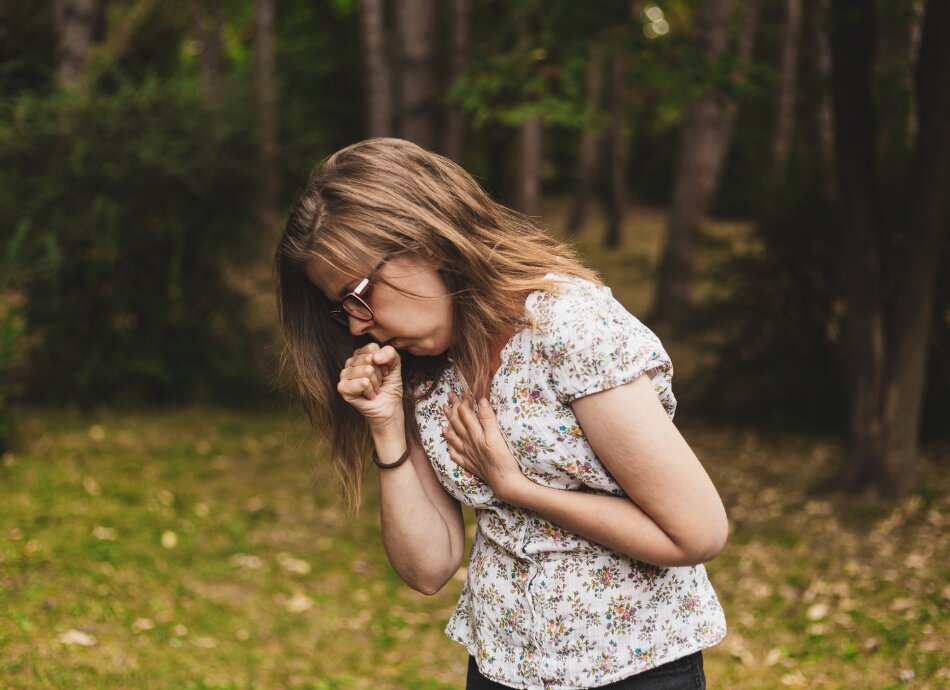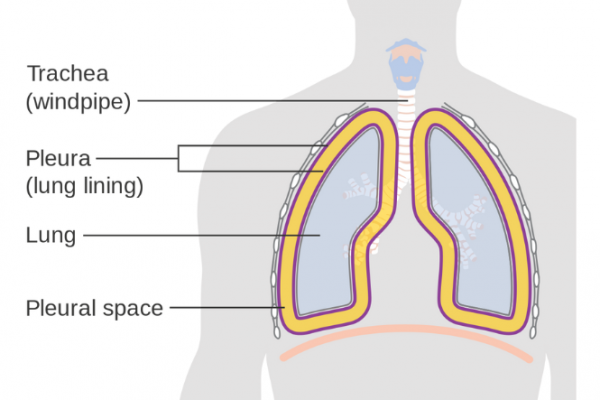Pleurisy
Key points about pleurisy
- Pleurisy is the inflammation of the pleura – membranes that line your lungs and your chest wall.
- The most common cause is a chest infection caused by a virus or bacteria.
- The main symptom is a sharp stabbing pain in your chest when you breathe in deeply, cough or sneeze.
- If you have pleurisy symptoms see your healthcare provider. If you have severe chest pain, and other symptoms, (eg, coughing up blood, nausea or sweating) see a healthcare provider immediately.
- If you get treatment early, you increase your chances of making a full recovery.

The membranes that cover your lungs and line your chest wall are called the pleura. A small amount of fluid sits in the pleural space between the 2 layers to allow them to move freely when you breathe in and out. When the pleura get inflamed, they rub and grate against each other, causing pain. This is pleurisy (also known as pleuritis).

Image credit: CRUK via Wikimedia Commons
The most common cause of pleurisy is a viral chest infection (eg, flu) or a bacterial infection (eg, pneumonia).
Less common causes include:
- a blood clot in your lungs (pulmonary embolism)
- injury – if your ribs are bruised or fractured, the pleura can become inflamed
- lung cancer
- autoimmune conditions, eg, rheumatoid arthritis and lupus
- a collapsed lung (pneumothorax)
- tuberculosis (TB)
- a fungal infection – usually if your immune system isn't working well because of medicines or certain disease, eg, blood cancer
- some inherited diseases, eg, sickle cell disease
- some medicines and recreational drugs.
The most common symptom of pleurisy is a sharp chest pain when you breathe in, cough, laugh or sneeze. You may also be tired, short of breath, have a dry cough, develop a fever and generally feel unwell.
If there's a more serious condition causing your pleurisy, you may have pain that develops slowly over days or weeks and doesn’t go away, or you may cough up blood.
Should I get help?
If you have any symptoms of pleurisy see your healthcare provider, any sort of chest pain should be looked into.
If you have severe pain, trouble breathing or you’re coughing up blood, call 111 or go to your nearest emergency department.
Your healthcare provider will do a physical exam, including listening to your chest with a stethoscope. If they hear a distinctive dry, crunching sound that suggests you have pleurisy, they may ask for further tests to find out what has caused the pleurisy and how severe it is. These might include:
- blood tests
- a chest X-ray or scan
- an electrocardiogram (ECG)
- a bronchoscopy – looking at your airways through a thin tube passed through your throat
- a biopsy – where a small sample of the pleural or lung tissue is removed for testing.
Treatment will depend on the reason for your pleurisy.
- If it's due to an underlying condition (eg, tuberculosis or other bacterial pneumonia, blood clot etc) that will be treated.
- If it’s due to a viral infection it will probably settle without anything being done. If the cause is bacterial you may be prescribed an antibiotic to treat the infection.
- The pain and inflammation can be treated with painkillers and non-steroidal anti-inflammatories (NSAIDs).
- If fluid has collected around your lung (a pleural effusion), the fluid can be drained off and you may be given medicine to stop it from building up again.
You can care for yourself by doing these things:
- Take painkillers or any other medicines as directed.
- Rest – try different positions to find a comfortable one. Lying on the painful side can help.
- If you have a viral infection, follow self-care advice for colds and flu.
- Get medical advice if you’re not improving or your symptoms are getting worse.
- Have an annual flu vaccination.
- If you are an older person, have a long-term condition or reduced immunity, talk to your healthcare provider about being vaccinated against pneumonia.
- Wash your hands carefully after using the toilet, before handling food and before and after caring for other people. Good hygiene reduces the risk of getting viral and bacterial infections.
- Don’t smoke.
Pleural effusion(external link) Patient Info, UK
References
- Pleurisy(external link) HealthDirect, Australia, 2021
- Pleurisy(external link) NHS Choices, UK, 2023
- Pleurisy(external link) Patient Info, UK, 2023
- Pleurisy(external link) Mayo Clinic, US, 2023
Pleural effusion
Pleural effusion(external link) Patient Info Professional, UK, 2022
Pleural effusion-aspiration(external link) Patient Info Professional, UK, 2020
TB and pleuritis
Corticosteroids may reduce the time to resolution of pleural effusion and may reduce the risk of having pleural changes at the end of follow-up by almost one-third. See Cochrane Database of Systematic Reviews. What is tuberculous pleurisy and how might corticosteroids work? 2017(external link)
Credits: Healthify editorial team. Healthify is brought to you by Health Navigator Charitable Trust.
Reviewed by: Dr Art Nahill, Consultant General Physician and Clinical Educator
Last reviewed:





